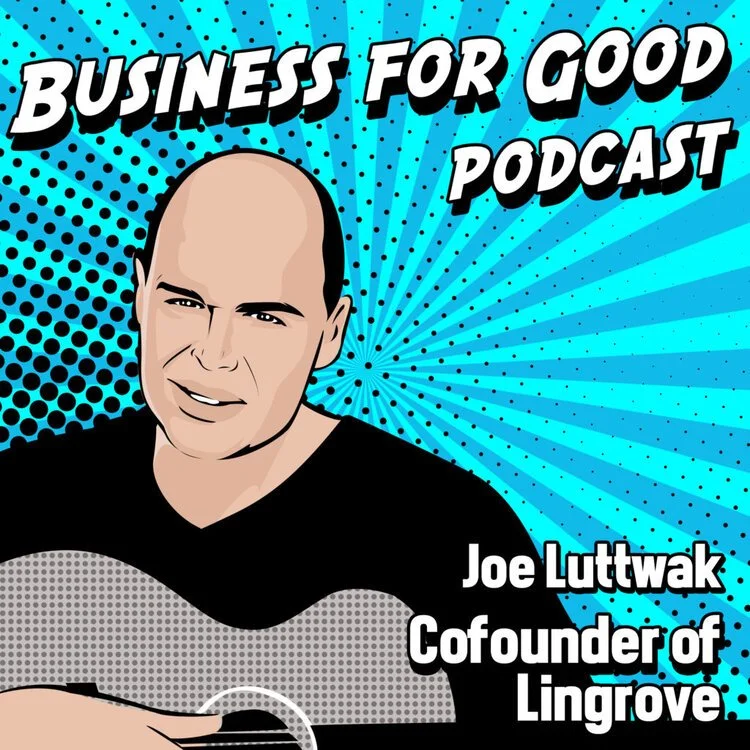EPISODES
All episodes
Lindsay Reinsmith and Jason Payne Are (Lab-)Growing a More Cultured Diamond Industry
Human rights and environmental advocates have tried to reform the diamond mining industry, but what if the answer was as simple as just growing diamonds in a lab? That’s what start-ups like Ada Diamonds are betting on. They sell lab-grown diamond jewelry that’s molecularly identical to naturally-formed diamonds, but for only two-thirds the price. In fact, the FTC just changed its definition of “diamond” to make it clear that lab-grown diamonds are indeed real diamonds, and that companies like Ada can market them as “cultured diamonds.”
Saving Trees with Joe Luttwak, the Entrepreneurial Lorax
Hear from Joe in this new interview about his journey from working at Ferari to founding a guitar company to now founding and running a company whose goal is, just like Dr. Seuss’s Lorax, nothing short of saving the trees.
Simon Griffiths on How Toilet Paper Can Save Lives
Toilets drastically improve health, life expectancy, school attendance rates, and more. And this episode, we’ve got someone who says every trip you make to the toilet can be a feel-good experience–since the company Simon Griffiths started, Who Gives a Crap, was founded for one reason: to give people in the developed world toilets.
The Saudi Arabian Prince Who’s Investing in a More Humane Future
His Royal Highness Prince Khaled bin Alwaleed bin Talal isn’t your typical vegan. A son of the man TIME magazine calls the “Arabian Warren Buffett,” he uses his wealth and influence to build a more sustainable world, supporting everything from plant-based and clean meat start-ups to virtual aquariums and clean energy.
Michelle Masek Uses Science to Make Your Produce Last Longer
Letting fruits and vegetables go bad before eating them is part of the massive food waste problem, and Michelle Masek’s company, Apeel Sciences, is helping solving it. With $110 million in funding, including from Bill Gates, they’ve created an invisible, organic, edible spray that farmers or grocers apply to their produce–like avocados–that makes it last at least twice as long. Miraculous? Seemingly, but it’s just another example of a company using its business to do good in the world.
Bharti Singhla Ushers In a Pollution Revolution
Black pollution is the new green in India, as Bharti Singhla points out in this episode. A chemical engineer, Bharti’s the executive vice president of strategy for Chakr.in–a start-up founded in 2015 that’s innovating a way to clear the air in a nation that according to the WHO has 14 of the 15 most polluted cities on the planet.
Seth Goldman on Sweetening the Less-Sugar Market
Seth Goldman started his career three decades ago thinking that if he wanted to make an impact on public health and agricultural sustainability, he’d need to explore a career in nonprofits or public policy. Fast forward to today and Seth’s company, Honest Tea, has helped slash billions of sugar calories from the American diet, caused other major drink brands to do the same, and created a sustainable livelihood for organic tea farming families throughout Asia.
Lisa Schon on Saving Wildlife with Bird-Friendly Glass
Windows kill upwards of a billion wild birds in America alone each year. Fortunately, we don’t have to take out our windows or keep the blinds down all the time. There are now glass brands like Ornilux that to us are transparent to the human eye, but that birds can actually see. And some cities are even requiring new buildings to be constructed with them.
John Mackey on Conscious Capitalism
As a student, John Mackey was an idealistic hippie who worked in a vegetarian co-op while studying religion and philosophy. He never took a business class during his whole academic career. In other words, he wasn’t exactly the guy people would’ve placed bets on to become a businessman, let alone one who’d launch a natural foods empire called Whole Foods Market that would get purchased by Amazon for $14 billion. (Note: John long ago stopped taking a salary and even donated all of his Whole Foods stock, so he didn’t see a penny of the sale.)



















